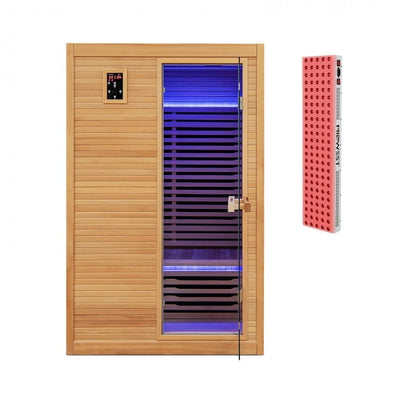Corona virus and Saunas
Coronaviruses are definitely replicating wildly this year – and there is good reason to worry about them. The death toll has hit 2858 and infection rate greater than 83,000 as of Feb. 27th, 2020. In China, there is still a lockdown to prevent further infection. This is one of many more potentially life altering pandemics we could face. Being proactive about your health is vitally important.
The disease affects the lungs, and causes common cold symptoms, fever, cough, difficulty breathing, GI problems, diarrhea, and shortness of breath. However, in some cases, coronaviruses cause pneumonia and can lead to death in about 2% of cases that seek medical help for it.
Everyone is looking for a remedy. Some wonder if saunas will kill coronaviruses while others can’t seem to get fast enough to the medical doctor to try some new medication, vaccine, or even blood transfusion.
To answer the question about whether or not saunas can kill coronavirus, you need a little bit of a background; first on the virus itself, and then on what the studies show.
But first of all: if you feel sick DO NOT go to a public sauna or gym.
In fact, one early Coronavirus survivor believes he may have been infected in the sauna. We highly recommend purchasing a sauna that you can install in your home.
You are putting others at risk by being in public, especially if you think you could have coronavirus. Consult a doctor, preferably over the phone to see how to get tested. If you are in the U.S., pay attention to guidance from the CDC.
As you’ll see, there’s good reason to think extreme heat could be beneficial in killing the virus, but we are not doctors and not providing medical advice.
What Is the Coronavirus?
The novel coronavirus, known as SARS-CoV-2 is a type of virus that has spikes on its surface (note: the disease caused by the virus is called COVID-19). The spikes resemble the spikes on a crown; hence the name “corona” in the coronavirus name.
Coronaviruses are really not new although most people haven’t heard about them prior to this pandemic. They are found in ducks, chickens, wildlife, farm animals, dogs, cats, squirrels, and humans.
Even camels in the Middle East have been found to be infected with coronaviruses. The coronavirus outbreak in the Middle East occurred in 2012 and was named the Middle East Respiratory Syndrome or MERS.
The coronavirus appears to be a manmade virus; reverse transcriptase enzyme allows it to run its metabolic activities. The coronavirus is very similar to SARS virus; SARS standing for Severe Acute Respiratory Syndrome. SARS virus somehow escaped the laboratory and caused havoc with almost 800 deaths back in 2003. Many of the research studies in the medical databases refer to SARS and coronavirus interchangeably.
How Coronaviruses are Transmitted
Like other viruses, the coronaviruses are transmitted through the air. That’s why you see people wearing masks in China on news reports. They’re attempting not to breathe in the virus, which would quickly make its way to the lungs and cause potential disease. What the news reports don’t tell you is that the virus is so small that it can enter paper masks. Only a N95 respirator would keep it out of your lungs, we recommend one like this.
An infected person can sneeze or cough and spew out coronavirus droplets to just about anything in a 5-8 feet radius. Thus, the virus would be hanging out on top of counters, surfaces, chairs, toys, and whatever or whoever is in its way.
Similarly if an infected person uses a tissue to blow his nose into, the ‘snot’ would be contaminated with coronaviruses. If he leaves the tissue in the room and someone else comes in to throw it out, she touches the infected tissue and now can spread it to herself or others she touches. If she touches her own eyes or mouth, lips, or tongue, viruses have gained entry to the body. On the other hand, if she washes her hands immediately after removing the tissue, she most likely will not infect others.
It’s possible to transmit the coronavirus before you have symptoms, and thus, if you go to the gym, whatever equipment you touch will be contaminated with the virus. This means anyone can become a superspreader, someone who infects dozens of people. This is likely because the incubation time period is up to two weeks.
Medical Treatment Obviously Is Not the Answer
Medical treatment for coronavirus is making sure the patient is well hydrated and sometimes using a ventilator to get oxygen into the lungs if needed. Sometimes an antiviral medication is used (Remdesivir). According to WHO, Remdesiver “may be the best shot for treating Coronavirus.”
But really, the bottom line is that the medical profession has not been able to control viruses – and the approach is generally to wait it out and try to support the body’s immune system during the waiting period. The harsh part is that sometimes in the waiting period, the patient dies.
This means you have to look for other options. And just as there were those who used essential oils with antiviral properties on masks back in the times of Swine Flu and lived without catching that deadly virus, there are going to be options today for coronaviruses. To ‘figure it out’, you have to think outside the box. What is it that the virus needs to flourish? What is it that kills it? All these questions have already been answered in the medical literature.
What Does the Medical Literature Say?
Let’s go to some of that medical literature now.
Background Information on Coronavirus
- Viruses die out when herd immunity – immunity of the population against the infection because a certain percentage of the population is immune to it – is found. Sometimes like in the case of influenza viruses, the viruses cross over to other reservoir hosts such as animals, birds, etc.
- The immune response to coronavirus infection causes heat shock proteins to be produced. Several pathways in the infected person will be activated in order to eliminate the coronavirus. (Saunas also cause heat shock proteins to be created in the body, thus contributing to the immune system process.)
- The coronavirus uses the endoplasmic reticulum in the cell as a site for synthesis and processing of viral proteins. (Thus, if you can strengthen this part of the cell, you can conceivably prevent the infection.)
- The mitochondria play an important role in antiviral immunity against SARS and the coronaviruses.
- Frequently touched surfaces of a university classroom cleaned daily contained viable human coronaviruses. (The virus lives in rooms…)
Is Sauna Temperature Enough to Kill Coronavirus?
- Coronaviruses (MERS-CoV) died when under environmental circumstances of 56 degrees Celsius (132 degrees F) for 25 minutes. Increasing the temperature to 65 degrees Celsius (149 degrees F) was even better and only one minute was needed to kill viruses. No killing was observed after 2 hours at 25 degrees Celsius (77 degrees F).
- The dried virus on smooth surfaces retained viability for over 5 days at temperatures of 22-25 degrees Celsius (72-77 degrees F) and relative humidity of 40-50%, typical of air-conditioned environments. However, viruses died quickly at higher temperatures and higher relative humidity (38 degrees Celsius – 100 degrees F – and relative humidity greater than 95%). This explains why Malaysia, Indonesia or Thailand with high temperature and high relative humidity environments do not have major community outbreaks of SARS.
- At a relative humidity of 75%, infectivity of the coronavirus was very sensitive to temperature, decreasing two orders of magnitude between 19 and 25 degrees Celsius (77 degrees F).
- At 4 degrees Celsius (39 degrees F), coronaviruses live up to 28 days but they can be inactivated at low levels of 20% relative humidity. The inactivation was more rapid at 20 degrees Celsius (68 degrees F) at all humidity levels. The viruses were inactivated more rapidly at 40 degrees Celsius (104 degrees F) than at 20 degrees Celsius. When high numbers of viruses are deposited on surfaces, coronaviruses causing both GI symptoms and respiratory symptoms may survive for days on surfaces.
- SARS-coronaviruses may be shed into the environment and transferred from environmental surfaces to hands of patients and healthcare providers. Once contaminated, hands can then initiate self-inoculation of mucous membrane of the nose, eyes, or mouth.
- Coronavirus infectivity was completely lost after 14 days of incubation at 22 degrees Celsius (72 degrees F), 33 degrees Celsius (91.4 degrees F), or 37 degrees Celsius (98.6 degrees F) but remained constant at 4 degrees Celsius (39.2 degrees F) for the same length of time.
- SARS coronavirus is inactivated at 56 degrees Celsius (132.8 degrees F), reducing the titer to below detection.
Bingo! This is all the information we need to solve the puzzle of whether or not we can use a sauna to kill coronavirus. Traditional saunas are generally in the range of 150-175 degrees F. Infrared saunas use a lower temperature of 120-140 degrees F. These temperatures will kill coronaviruses. Thus, if an infected person with coronavirus went into your sauna, you could kill the virus by the heat.
If you have been exposed to coronavirus, no doubt the virus is on your skin. It could be killed by the temperatures in the sauna. The more virus particles you kill, the quicker your recovery because the virus isn’t reproducing.
There are additional benefits to regular sauna use that will promote good health and could offer additional defense against sickness.
Saunas also increase heat shock protein production, which contribute to protection of cells and survival against environmental stress (such as virus attack). They participate in protein assembly, turnover and regulation and protect the cell by stabilizing unfolded proteins. This then allows the cell time to repair itself or remake any proteins that have been damaged.
Does the sauna kill coronavirus? You bet! Science has already proved it.




Leave a comment